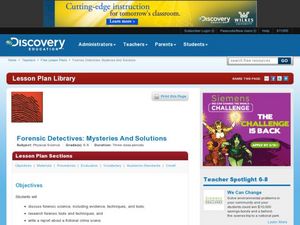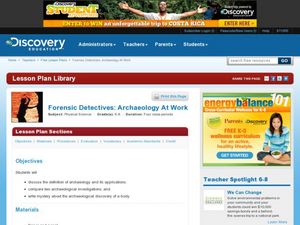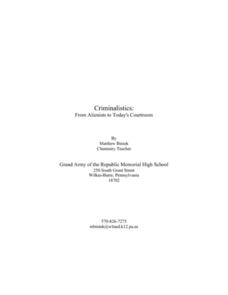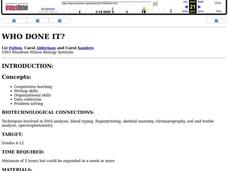Curated OER
Murder Mystery
High schoolers examine how to capture foot prints while they simulate a criminal investigation. They discover how the clues are needed for identifying or eliminating murder suspects.
Curated OER
Magnificent Microscopes Unit Including Mystery and Alternative Assessment Activity
After drawing and labelling a microscope, forensic science explorers use one to solve a simulated murder mystery. They examine each piece of evidence and draw what they observe at each magnification. Working in groups of four, your...
Cold Spring Harbor Laboratory
Higher Cells Incorporate an Ancient Chromosome
Chromosomes contain keys to history including links from royalty to Neanderthals. Young scientists learn about Ivan Wallin's research into chromosomes with an animation and videos. Then, the concept connects to mysteries related to...
Curated OER
Murder Ewe Wrote
Students solve ecological mystery, diagram solution, and create alternate plans to prevent combined conditions from recurring.
Cornell University
Plant Cell Crime Scene
Use science to solve the mystery of the Poplar murder. Pupils use forensic botany to determine if a suspect could be the killer. By analyzing images from a Transmission Electron Microscope, learners determine if the material found on the...
Curated OER
Forensic Detectives: Mysteries and Solutions
Young scholars examine forensic science. In this video based lesson, students examine the tools and techniques of forensic science. They write a report about a fictional crime scene from the Discovery video.
Curated OER
Forensic Detectives: Archaeology at Work
Dig in! Middle schoolers learn about archaeology by exploring the remnants of the Chiribaya bodies found in Illinois. Compare archaeological investigations, and then write a mystery detailing the discovery of a body! Consider bringing in...
Curated OER
Science: Criminalistics - A New Look at Crime
Students examine the world of forensic science, focusing on fingerprint analysis. In the lesson, they implement a method by which fingerprints of class members are categorized and identified. Elementary students study classification...
Curated OER
Stonehenge: Solving Ancient Mysteries
Students explore archeologists and anthropologists and the tools and methods they use to gather and interpret scientific evidence. They research current archaeological excavations and contact the scientists working at these digs.
Curated OER
Forensic Examination of Artifacts: The Mystery of Meriwether Lewis' Death
Students role play the position of a scientist to gather information on Meriwether Lewis' death. They discover what he did after the famous expedition and how centuries affect the study of a body. They share their information with the...
Curated OER
Who Done It?
Pick and choose which activities to include in this crime scene investigation. Junior detectives can examine fingerprints, DNA, blood samples, or bone structure. The plan suggests you have teams solve a mystery, but it does not...
Curated OER
Who Done It?
Learners work in groups to solve various murder mysteries using DNA evidence to implicate suspects. Teams compete to solve the crimes the fastest, while using various scientific methods to accomplish their task.
Curated OER
GeoSleuth Schoolyard
Pupils discover that geology is something that is all around them. In groups, they participate in an activity in which they collect evidence and make observations. They solve a "murder mystery" in examining the history of a landscape.
Curated OER
CSI: Native America
Learners discuss the murders of Native Americans in Indiana. In groups, they research and make drawings of the scene as if they were part of a CSI team. They complete any needed experiments to help them solve the crime and create a...
Curated OER
The Ebb-Tide
Students study "The Ebb-Tide", an original drama based on the novel by Robert Louis Stevenson."The Ebb-Tide", like many of Stevenson's works, is a nautical adventure combining mystery, murder and memorable char
Curated OER
Mission Possible
Students, in teams, solve a crime using forensic lab techniques. They apply lab techniques to a real life situation using a crime scenario that takes place on campus. Sample activities include Blood, Fiber, and Hair Lab.
Curated OER
Lost Baby
Young scholars simulate the steps involved in creating a DNA fingerprint by the RFLP technique. They analyze RFLP patterns to determine the parentage of a missing baby.
Bryn Mawr College
Serendip: Using Blood Tests to Identify Babies and Criminals
Brief text summary of what students learn in the Using Blood Tests to Identify Babies and Criminals lab along with links to download Student Handouts and Teacher Preparation Notes in PDF and Word formats. The lesson includes two...



















